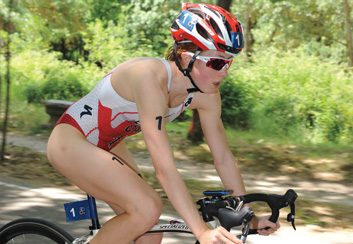Q & A with Olympian Paula Findlay
We caught up with 23-year-old Paula Findlay to get her reflections on the past year, and to see what’s in store for the future

Source: Best Health magazine, May 2013
The past year has been a hard one for Paula Findlay. A hip injury made training difficult leading up to the London 2012 Summer Olympics, and she had a heartbreaking last-place finish in the triathlon (an event the Edmonton native had hoped to win). Since then, the triathlete has dealt with an anemia diagnosis, her dad’s cancer and a new training regimen she’s hoping will get her back to the level she was once competing at.
Best Health: Now that some time has passed since the 2012 Summer Olympics, has your perspective changed?
Paula Findlay: I’m still upset, and it wasn’t the race I went there to do, but I was interviewed maybe five minutes after I crossed the finish line, and that’s when I apologized to the nation. That was totally raw emotion, so I don’t regret it. I feel I did my best to prepare, and that’s just how it turned out. Looking ahead, I’m excited about learning from those mistakes and getting ready for the 2016 Olympics in Rio.
BH: After that triathlon, how did you find out you had been suffering from iron deficiency anemia?
PF: A few weeks after the Olympics, I had a blood test to make sure my iron levels were good. The results came back and revealed I was anemic, so I ended my season, and also got a new coach. I’m focusing on eating a healthy diet and taking iron supplements. I’m definitely feeling better now, and I’m ramping up my training, but it’s something I’ll have to pay attention to, probably for the rest of my triathlon career. When you’re training so hard, anemia isn’t the first thing that comes to mind when you feel tired. You think it’s because you’re training for four or five hours a day.
BH: How did your sponsors feel about what happened?
PF: I’m lucky to have sponsors like Specialized and Nike, who understand that injuries are part of being an athlete and we can’t always be at the top of our game. They believe in my ability to get back to where I was in 2011 and are continuing to support me in the coming years. I can’t thank them enough and I’m so proud to represent them.
BH: Are you feeling confident now?
PF: It’s been tough to keep going after what happened at the Olympics. But I’ve been lucky to have people who believe in me more than I sometimes believe in myself. My family is my biggest support network’my mom, dad, sister Adrienne and brother Colin. And I have an awesome group of friends who came to watch me in London; after my disappointing race, they were all incredibly understanding.
Online bonus questions!
BH: Are you constantly trying to balance how hard to push your body versus when to listen to it?
PF: A few years ago, and last year even, I constantly wanted to push and push. I thought that would make me faster and better and stronger, but it ultimately led to an overall pretty disastrous year. I’ve learned that recovery is just as important as training hard. You learn through experience and injuries and the lows.
BH: You began in swimming, but is there one part of the triathlon that’s your favourite?
PF: Definitely running. because that’s an area that I’m strongest in. I also like cycling even though I’m still learning and becoming stronger on the bike.
BH: Your dad recently had some health issues. How’s he doing?
PF: He was diagnosed with colon cancer in the fall and underwent surgery to remove it. He’s now almost fully recovered, and back to being super-fit and active. It’s definitely been inspiring for me because no matter how hard I think my year has been, it’s nothing compared to being diagnosed with cancer.
Visit Paula’s blog for more updates and to follow along with her training.
This article was originally titled "Q & A with Paula Findlay" in the May 2013 issue of Best Health. Subscribe today to get the full Best Health experience’and never miss an issue!




